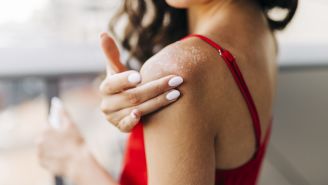7 expert-approved skincare secrets to live by
Take better care of your skin with these quick lessons from a dermatologist.
Updated on July 28, 2023

It’s no secret that drinking enough water, getting a good night’s sleep, and eating a healthy diet can improve the appearance of your skin. But there are other simple things you can do. Check out these expert-approved tips from a dermatologist.

Wash your face daily
Your facial skincare regime should include daily cleansing with a mild soap and weekly exfoliating, says Sorahi Toloyan-Rahimi, MD, a Las Vegas-based dermatologist. For daily cleansing, she recommends using a cleanser with alpha hydroxy acid—gel-based products for normal skin and cream-based ones for dry skin. For exfoliation, she recommends using a salicylic acid-based product no more than twice a week. Be careful not to over exfoliate or scrub. “Scrubbing or washing too frequently with a harsh soap or exfoliation creams can cause dry skin, scaling, tightness and wrinkling down the road,” says Dr. Toloyan-Rahimi.

Apply sunscreen every day
Sunscreen isn’t just for summer. It should be applied every morning and repeated every two hours throughout the day if you’re outside, whatever the weather.
“Wearing sunscreen keeps the skin healthy and [helps] prevent [premature] wrinkling, discoloration, and dryness,” says Toloyan-Rahimi. But which SPF is best? It depends. If you have fair skin, Toloyan-Rahimi recommends an SPF of 50. For everyone else, SPF 30 will do the job. Apply it to your face, neck, and other areas exposed to the sun, even on cloudy days, to prevent damage from the UV rays.

Don’t pick
When you have a zit, it can be hard not to pick at it. But doing so may cause an even bigger problem. “If you squeeze it, you will damage a deeper part of the skin and that can cause scarring, and if it’s on the nose, it can cause severe infections,” warns Toloyan-Rahimi. Leave the bump alone or treat it with an over-the-counter acne product. If it doesn’t clear up or it gets worse, consider making an appointment with a dermatologist.

Get moving
Add glowing skin to the long list of health benefits associated with regular exercise. “Exercise is great because it makes you relax. When you’re relaxed, your skin tone gets better, and your muscles get stronger and hold the skin better,” says Toloyan-Rahimi. Being active can also increase blood flow, improve sleep, and help ease stress—all of which contribute to better skin.
Worried about sweat clogging your pores? Avoid wearing makeup during workouts, opt for moisture-wicking clothes, and shower or wash your face once you’re finished.

Shower smart
Skip steamy showers, since long periods of hot water exposure can dry out the skin. Another tip? Moisturize right after you dry off. “When you have damp skin and then apply the moisturizer, it seals the water in, and you’ll get better results,” says Toloyan-Rahimi. She also suggests using a humidifier at night to moisten the skin in dry weather, especially in winter.

Nourish your skin with vitamin serums
We’re not just talking about taking a daily multi-vitamin—although that may help, too—we’re talking about using skin-nourishing products. “For anyone who feels their skin is getting dry, I recommend using vitamin C and E drops. They improve fine lines and wrinkles by helping build collagen and smoothing the skin,” says Toloyan-Rahimi. If you apply the drops before your moisturizer, you’ll see a difference in just a few months, she says.

Personalize your regime
Healthy skin requires some effort, but your routine doesn’t have to be elaborate. “Personally, I’m not going to use a six-step process every night and I don’t expect my patients to either,” says Toloyan-Rahimi. She suggests this realistic plan:
- In the morning, wash your face with a gentle cleanser, and then apply a vitamin C serum and sunscreen. Use a moisturizer along with sunscreen if your face is dry.
- Before bed, wash your face and apply a night cream. You can use your regular night cream around your eyes, too.
- Don’t forget to exfoliate once or twice a week.
You can apply a mud mask weekly, she adds, for a little extra boost.

American Academy of Dermatology Association. Face Washing 101. Accessed July 28, 2023.
American Academy of Dermatology Association. How to Safely Exfoliate at Home. Accessed July 28, 2023.
American Academy of Dermatology Association. What Can Treat Large Facial Pores? Accessed July 28, 2023.
U.S. Food & Drug Administration. Sunscreen: How to Help Protect Your Skin from the Sun. Current as of May 24, 2023.
Centers for Disease Control and Prevention. Skin Cancer: Sun Safety. Last reviewed April 18, 2023.
American Academy of Dermatology Association. Sunscreen FAQs. Last updated July 19, 2023.
American Academy of Dermatology Association. Acne: Tips for Managing. Last updated November 16, 2022.
American Academy of Dermatology Association. How Your Workout Can Affect Your Skin. Last updated May 27, 2021.
Ryosuke O, Yoshie S, Hiromi A. The association between activity levels and skin moisturising function in adults. Dermatol Reports. 2021 Mar 17;13(1):8811.
UPMC Health. Is a Hot Shower Bad for Your Skin? May 24, 2022.
American Academy of Dermatology Association. 8 Ways to Stop Baths and Showers From Worsening Your Psoriasis. Accessed July 28, 2023.
American Academy of Dermatology Association. Dermatologist-Recommended Skin Care for Your 20s. Last updated February 23, 2023.
Neera Nathan, MD, MSHS, and Payal Patel, MD. Why is topical vitamin C important for skin health? Harvard Health Publishing. November 10, 2021.
Cheryl Wei Ling Teo, Shawn Han Yueh Tay, Hong Liang Tey, Yee Wei Ung, Wei Ney Yap; Vitamin E in Atopic Dermatitis: From Preclinical to Clinical Studies. Dermatology 30 June 2021; 237 (4): 553–564.
Lee CH, Lee KWA, Chan KW, et al. Review of topical vitamins in photoaging skin. J Cosmet Med 2022; 6(2): 67-71.
Keen MA, Hassan I. Vitamin E in dermatology. Indian Dermatol Online J. 2016 Jul-Aug;7(4):311-5.
American Academy of Dermatology Association. 10 Skin Care Secrets for Healthier-Looking Skin. Accessed July 28, 2023.
More On


video

slideshow


video


video
